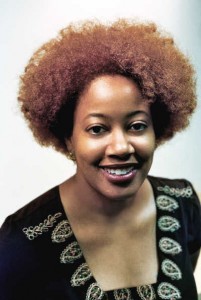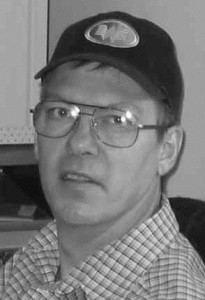by Marshall Payne
 N. K. Jemisin lives and writes in Brooklyn, NY. Her short fiction–published in CLARKESWORLD, BAEN’S UNIVERSE, and other markets–was nominated for a Nebula and a Hugo in 2010, so she’s thrilled that her first novel has gotten the same treatment in 2011. THE HUNDRED THOUSAND KINGDOMS is the first book of the Inheritance Trilogy, of which the second book (THE BROKEN KINGDOMS) is also out, and the third (THE KINGDOM OF GODS) is forthcoming, all three from Orbit Books. Her website is at nkjemisin.com
N. K. Jemisin lives and writes in Brooklyn, NY. Her short fiction–published in CLARKESWORLD, BAEN’S UNIVERSE, and other markets–was nominated for a Nebula and a Hugo in 2010, so she’s thrilled that her first novel has gotten the same treatment in 2011. THE HUNDRED THOUSAND KINGDOMS is the first book of the Inheritance Trilogy, of which the second book (THE BROKEN KINGDOMS) is also out, and the third (THE KINGDOM OF GODS) is forthcoming, all three from Orbit Books. Her website is at nkjemisin.com
The Hundred Thousand Kingdoms is the first book in The Inheritance Trilogy. When did the idea for the series first come to you?
Originally I thought of the story about 14 or 15 years ago, while I was in graduate school. It was probably some kind of reaction to thesis-writing stress; I remember having a vivid and disturbing dream of very strange people. One was a man with stars in his hair. If you tried to touch his hair your hand would just keep going and you’d fall in. Another was a boy juggling these beautiful polished stone balls — which, when you looked closely, turned out to be planets. I woke up in a fever to come up with a narrative to explain these characters. These images sort of fused with all the mythology I’d absorbed over the years and turned into enslaved gods.
When writing The Hundred Thousand Kingdoms what was your writing process like? Did that process change as you wrote?
Well, I wrote the novel twice. The first time, back when I first came up with the idea, it was very traditional epic fantasy: third person, a male protagonist; there was a journey to acquire the MacGuffin of Power (the Stone of Earth), I think there was some swordplay here and there. Very traditional, and a bit boring. It didn’t sell — rightly — and I trunked it. But years later I decided the concept had good bones, so I shed the treatment and started fresh, stopped trying to adhere to tradition and boring myself, and wrote it the way I felt like writing it. That basically meant using the old novel as a kind of very detailed outline, and otherwise completely revamping the whole thing.
That’s not my usual writing process, though — who can afford to write every novel twice? I usually write a detailed outline of maybe 15-20 pages, including character profiles and brief worldbuilding notes. Sometimes I start a wiki — I’ve done that with the Inheritance Trilogy, so I can easily look up concepts or made-up words I’ve forgotten from book 1 to book 3. Then I usually write a few “test chapters” to get the voice of the story right — I try different characters’ PoVs, different tones, first person and third person, and so on — and once I feel that one of those chapters works, I start writing in earnest.
Yeine Darr is the first person narrator here. Besides her, who is your favorite character in The Hundred Thousand Kingdoms?
In that book alone? Kinneth. She’s not really in the book per se, but she’s very much the most powerful character in it. I couldn’t have written the story from her perspective, because it’s not really about the Arameri — but I tried to make it clear that she’s been the chessmaster of the story’s events, even from the grave.
In the whole trilogy, my favorite character is Sieh. But I can’t talk much about that because he’s the protagonist of book 3 and that might lead to spoilers.
In writing Book One, what was the hardest part? The easiest?
Probably the political intrigue was hardest, because it interested me the least. I’ve written stories whose focus/purpose was politics, and when that’s what I intend, I enjoy writing it — the forthcoming Dreamblood novels are all politics, all the time — but in this case my purpose was to play with mythological archetypes. I suspect some readers wanted the opposite — more politics, less myth. But I wanted to write something inspired not by oh, George R. R. Martin or J. R. R. Tolkien, but by the myths and epics of old: Zeus’ tragicomic love affairs with mortal men and women; Nephthys, the Egyptian goddess who caused the Nile to flood by screwing around with her sister’s husband; the endless adventures of tricksters like Anansi and Loki and Coyote and Inari; the moon goddess Chang’e, who got turned mortal as fallout when her husband killed nine of the Jade Emperor’s sons… there’s just so much cool stuff there to play with. How can mere politics compare? So obviously creating the cosmology and infusing that into the plot came easiest.
Do you consider yourself a slow methodical writer or a quick facile one?
I’m quick when I don’t have a day job. Alas, gotta pay the bills, so that makes me slow. But regardless of my speed, I’m very methodical. I start each new writing session by rereading what I wrote before, to preserve continuity. I write for several hours until I reach a quota — or I keep going, if I feel like it, but I have to at least hit the quota before I can stop. Every few chapters I stop and re-read the whole thing and the outline, to make sure I’m on-track. Then when the first draft is done, I give it to my writing group for a critique session a month away — and then I set it aside, so it can go “cold”. I start something else, take a vacation, whatever. Then once my writing group has offered critiques, I reread the whole thing from scratch and make changes.
You also write short fiction. Are there rewards in writing short fiction that you don’t find in novel-writing, or do you prefer the long form?
I enjoy both about equally. The rewards for each are different, but equally satisfying.
Who are a few of your literary influences, especially in regards to The Inheritance Trilogy?
Well, mythology, as I mentioned. But also epic fantasies rooted in created myth — Louise Cooper’s Time Master trilogy, Michael Moorcock’s Elric saga, C. S. Friedman’s Coldfire trilogy, Tanith Lee’s Flat Earth, Storm Constantine’s Wraeththu.
What are a couple of your interests outside of fiction?
Travel’s a big one. I’m actually writing this from a hotel room in Epinal, France, where I’ve come to attend the Imaginales Festival; it’s been a wonderful experience, even though I don’t speak lick one of French. I don’t always have the wherewithal to travel overseas, but I also enjoy traveling to local sites — last year my writing group did its annual retreat in Gettysburg, Pennsylvania, in a farmhouse full of antebellum memorabilia. A few years back I visited Canyon de Chelly in the Navajo nation, in Arizona, to look at Anasazi cliff dwellings. There are adventures everywhere, if you’re willing to go look.
Gaming’s a cheap way of doing the same thing, I suppose — video games, I mean, though a long time ago I used to do pen-and-paper roleplaying. These days my favorite RPGs are for consoles, and I tend to prefer the Japanese ones over the American ones. They tend to spend more energy on worldbuilding and aesthetics versus gameplay mechanics, so I get a greater feeling of visiting some exotic — if imaginary — place.
What projects do you have planned for the future, and what are you currently working on?
Well, the third book of the Inheritance Trilogy, THE KINGDOM OF GODS, comes out in October of this year. In 2012 Orbit will be releasing my next two novels, the Dreamblood duology, back to back in midsummer. Those books are set in a fantasy world inspired by ancient Egypt, in which a priest within a corrupt theocracy must use dream magic — narcomancy — to save his land. The second book of that duology focuses on a priestess in the same theocracy, who must battle a deadly plague of nightmares with the help of an exiled prince. I’m currently working on a new fantasy that will focus on a woman trying to save her daughter from her murderous husband; this takes place at the end of the world. Can’t talk about that one too much because it’s too new.
Where do you hope to see your career in five years?
It would be nice to win a Nebula or a Hugo. It would be nice to publish more books. But beyond that, I would like to see my writing success lead to other related opportunities. I’m interested in working for a gaming company, though I’ve never done that before; I’ve been exploring ways to break in. I’d like to teach writing classes and/or workshops; I’d love to do columns for media magazines; it would be nice to sell a movie option — though I know that’s more of a lightning strike than something I can work towards, and though I worry about what might be done to my work in the process of producing it for the screen. I won’t say that I want to be a full-time writer, because I tried that for three months a couple of years ago, and it was miserable. Boring, lonely, and it turned writing from a joy into a chore. I’m the kind of woman who likes to be busy, so I will likely always work a day job — but racheting down to part-time would be nice. To do that, I’ll need my writing career to become a more steady income generator.
Marshall Payne has worked as a touring musician, music producer, sound technician, a salesman, and a waiter. He has written over 100 short stories and his fiction has appeared in Aeon Speculative Fiction, Brutarian, Talebones, Hub Magazine, Triangulation: End of the Rainbow, to name a few. He has a website at http://marshallpayne.com/and a blog at http://marshallpayne1.livejournal.com/.

